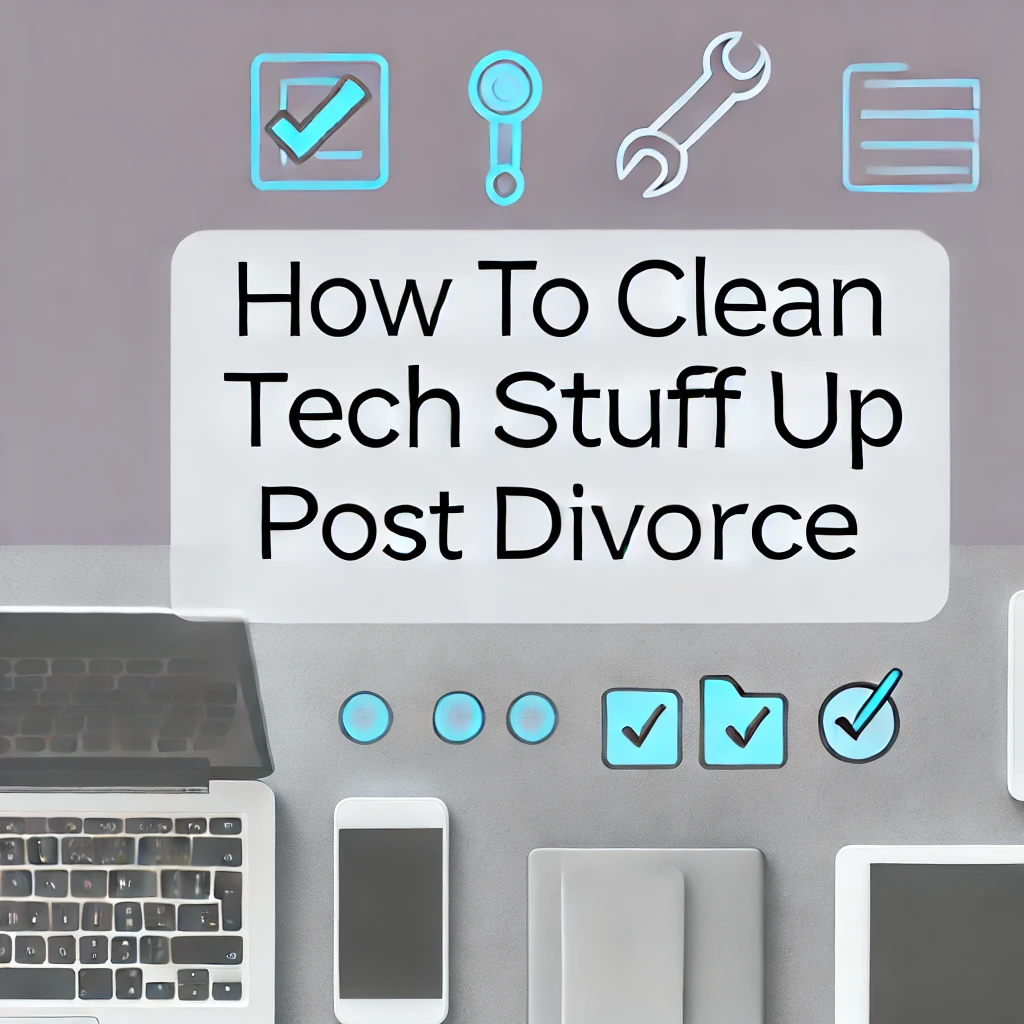Divorce is a challenging experience, and along with emotional and legal processes, one critical area to address is learning how to clean tech stuff up post divorce. Securing your digital life not only ensures your privacy but also helps protect sensitive information from unauthorized access. In this guide, we’ll walk you through step-by-step instructions on securing devices, accounts, and online services after a divorce to help you start fresh.
Assessing Your Digital Footprint
Before diving into the cleanup, it’s important to assess your entire digital footprint. Think about all the devices you use, such as smartphones, tablets, laptops, and even smart home devices. Additionally, make a list of all your online accounts, including email, social media, cloud storage, banking apps, and streaming services. Assessing this footprint is crucial as it helps you identify potential vulnerabilities and which aspects need immediate attention.
Many people overlook how interconnected their digital lives have become. During a marriage, couples often share account logins or devices, meaning your ex-partner might still have access to sensitive information.
Understanding the Importance of Digital Security Post-Divorce
Learning how to clean tech stuff up post divorce is not just about safeguarding personal information but also about avoiding potential legal and financial consequences. If your ex-partner still has access to your accounts or devices, they could misuse them intentionally or unintentionally, resulting in unauthorized purchases, data breaches, or even privacy violations.
By taking these steps now, you will not only protect your online presence but also gain peace of mind moving forward.
How to Create a Digital Security Plan
A structured approach is necessary when cleaning up tech after a divorce. Start by developing a digital security plan. This should include steps like:
- Listing all devices and accounts.
- Changing passwords for all accounts (especially for banking, cloud storage, and email).
- Enabling two-factor authentication (2FA).
- Revoking access to shared accounts.
- Backing up and securing your data.
This plan will ensure nothing gets overlooked during your digital separation process.
Changing Passwords and Securing Accounts
A critical part of how to clean tech stuff up post divorce is to change all your account passwords, particularly for sensitive platforms like email, banking, and social media. Use strong, unique passwords for each account. It’s essential to avoid using any personal details that your ex might know, such as birthdays or anniversaries, as part of your password.
If you’re overwhelmed by managing multiple passwords, consider using a password manager, which can generate and securely store all your login credentials.
Managing Shared Subscriptions and Online Services
During the marriage, you may have shared subscriptions like Netflix, Spotify, or Amazon Prime. To clean tech stuff up post-divorce, it’s vital to manage these services. Either transfer control to one partner or cancel joint accounts and start new ones individually.
Some services, like cloud storage or family-sharing plans, can still have lingering access after divorce, so be sure to revoke access to anyone who should no longer have it.
Handling Smart Home Devices and IoT Gadgets
If your home was equipped with smart devices such as cameras, thermostats, or even voice assistants, it’s crucial to reset them and ensure your ex-partner no longer has access. Factory resetting the devices and changing the Wi-Fi password is a great way to regain control.
Overlooking smart home devices could mean that your ex still has access to private information, video feeds, or even remote control over household systems.
Resetting and Securing Personal Devices
Another important step in how to clean tech stuff up post divorce is resetting personal devices like smartphones, tablets, and laptops. Performing a factory reset ensures all personal data is wiped and that no unauthorized access remains.
Before resetting, make sure to back up all your important data to a secure cloud account or an external hard drive, and ensure that this backup is safe and protected with strong passwords.
Managing Children’s Tech Devices and Accounts Post-Divorce
If you have children, managing their tech devices and accounts is an additional layer of complexity. Ensure that both parents have agreed upon access, and check parental controls, if applicable. Change any shared accounts or devices that your children might use.
This is a critical aspect of protecting your children’s privacy and security, especially if they have access to shared family accounts or devices.
Monitoring and Maintaining Digital Security After Divorce
After you’ve completed the cleanup process, it’s essential to monitor your accounts regularly. Keep an eye on any suspicious activity, login attempts, or unauthorized access. Enable account activity notifications wherever possible, so you’ll be notified if someone attempts to access your accounts.
This proactive monitoring ensures that you maintain security over the long term and quickly address any issues that arise.
FAQs: How to Clean Tech Stuff Up Post Divorce
Q: What’s the first step in cleaning up tech after divorce?
A: The first step is assessing your digital footprint by listing all devices and accounts, identifying which ones may still be shared, and determining what needs to be secured.
Q: Should I change all my passwords after a divorce?
A: Yes, changing passwords for all major accounts like email, banking, and social media is critical. Use strong, unique passwords for each one.
Q: How can I protect my smart home devices post-divorce?
A: Reset your smart home devices to factory settings, change the associated Wi-Fi passwords, and ensure your ex-partner no longer has access to any connected devices.
Q: What should I do about shared subscriptions?
A: Transfer ownership, cancel the subscription, or set up individual accounts, depending on what is most appropriate for each service.
Q: How can I make sure my personal data is safe after divorce?
A: Back up your data to a secure cloud or external drive, change passwords, enable two-factor authentication, and monitor your account activity regularly.
